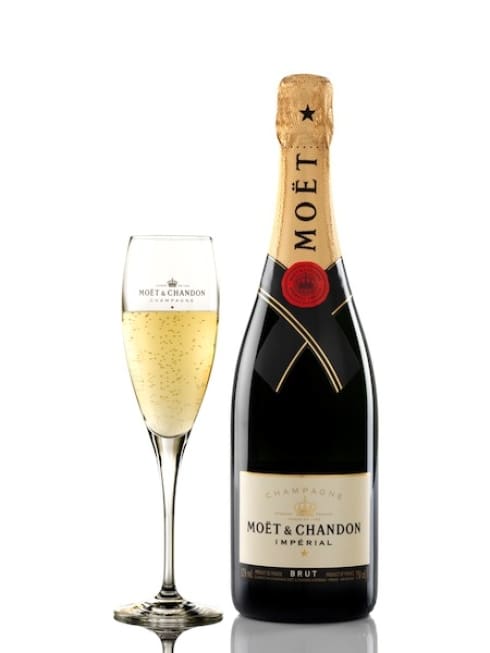Champagne can be complicated and intimidating. We want to want it, because Freddie Mercury sings about Moet, Holly Golightly drinks it before breakfast, and Bond and Bollinger go hand in hand. But what is it? Why is it so expensive? And what about all the other sparkling wines out there?
Image: Moet
I will admit Champagne is serotonin to my lips. Facetiously, it boosts my ego and toys with the promise of the good life, though you will never witness a precious drop wasted when I pop my bottles (unlike the end of a U2 concert). But when I drink it, I mysteriously become present in the moment, like each savoured bubble is titillating my soul. Clocks cease, peace ensues. Sip, sip again.
My love story aside, strip away the smoke and mirrors and Champagne is still just sparkling wine, and this world has no shortage of brilliant winemakers who share in this bubbly passion. The disconnect happens when you reach the liquor store wall and suddenly you are staring down 100 different bottles varying in grape, shape, brand, and price. How do you even begin to choose?
Get to know your bubbly basics with this quick breakdown of language and style, and you’ll have the right bottle of fizzy in your hands before breakfast hits the table.
Champagne is the classic example of sparkling wine, and comes exclusively from the Champagne region in France. Step outside of Champagne and sparkling wine is referred to as Cremant or Mousseux. Step outside of France and you’ll find Cava from Spain, Prosecco and Asti from Italy, Espumante from Portugal, and Cap Classique from South Africa. This list is ever growing.
FRESH AND FRUITY
If you like your sparkling wine dry with a fruity zing, try these styles of wine:
· Most Non-Vintage (NV) Champagne
· Cava
· Cap Classique
· Bru tand Extra-Dry Prosecco
· Riesling Sekt
· Most sparkling wine from America
· Most sparkling Rose
· Look for these words: Brut, Extra Brut, Brut Nature, or Extra-Dry
Image: Quintessential Wines
SWEET AND CANDIED
If you like your sparkling wine sweet and zippy, look for these labels:
· Dry Prosecco
· Demi-sec, Doux, and Dolce sparkling wines
· Asti Spumante or Moscato d’Asti
QUICK TIP! Look at the alcohol content to better gauge if the wine is sweet. Lower alcohol indicates a sweeter wine, whereas higher alcohol indicates a dry wine.
CREAMY AND NUTTY
If you like your sparkling wine rich, with autolytic notes (biscuit, bread, toast) or oxidative flavours (nutty and honeyed) look for these styles of sparkling wine. Wines with these characteristics have usually undergone a more complex production method, or have been aged, meaning they might cost more money. But they are worth every penny.
· Vintage Champagne
· Reserva and Gran Reserva Cava
· Most sparkling wine with 3+ years on the lees
Even with these guidelines, sparkling wine can take some unexpected turns in style and expectation, so remember to use your wine journal to keep track of your wines, and good luck exploring! —Laura Starr
For more tips from our Wine Editor, check out her summer wine picks here.






Be the first to comment